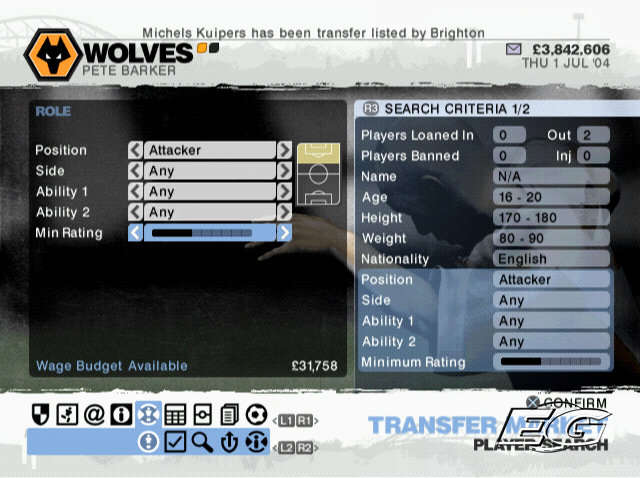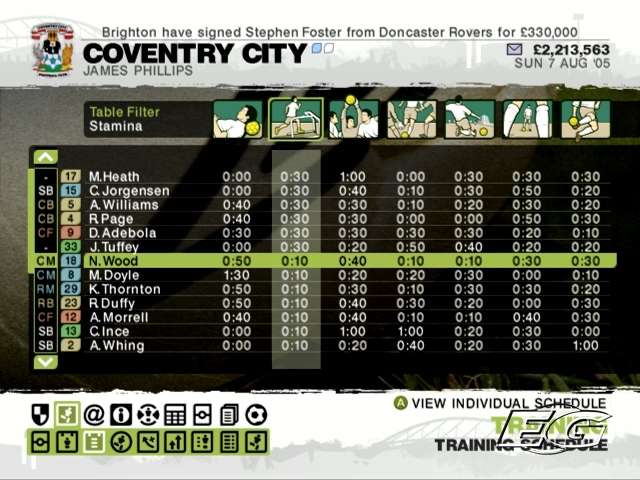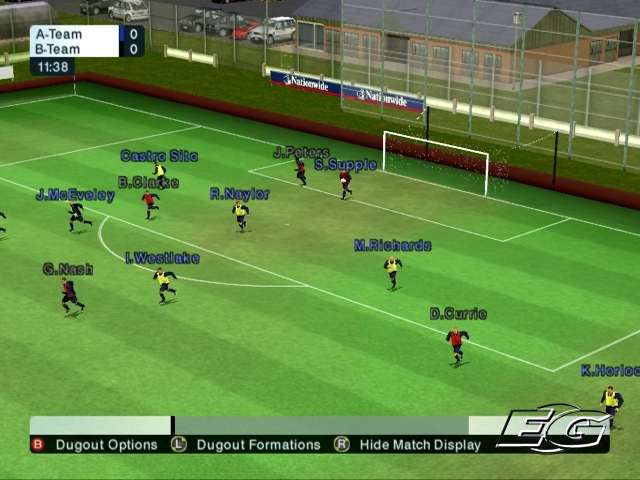LMA Manager 2006
Yellow card for simulation.
As a kid, I discovered a £1.99 football management game for the Spectrum called On The Bench. I really enjoyed it until I discovered that you didn't actually need to field a full eleven in each match. In fact, I found that you could simply sell your entire fourth-division first team, buy Gary Lineker (or an equivalent big-name player), and allow him to single-handedly win matches for you. I didn't play it again, and - this being 1988 - felt positively virtuous for having pirated it.
LMA Manager 2006 doesn't have a similarly cataclysmic design flaw, but it's very much a game of two halves.
Its interface isn't particularly intuitive, but it's something that you soon become accustomed to using. The left and right trigger buttons are used to cycle through nine icons in the bottom left-hand corner of the screen. These provide access to groups of sub-menus that you can navigate with the analogue sticks and directional pad. Handily, ways in which you can interact with each page are always highlighted in a 'help bar'. It has a somewhat cumbersome feel, especially at first, and obviously lacks the immediacy of a mouse-operated system, but it's never less than functional once you overcome an initial period of bewilderment.
In terms of scope and size, LMA Manager 2006 certainly feels impressively large. There are eight countries to choose from, each with at least two leagues. There's a suitably sizable player database, a fixture calendar that features all the major cup and league fixtures you might expect, and a Sky Sports News-style information service called Football One that pops up regularly to provide information on results, player moves and other such events. Any developments pertinent to the running of your club appear in a mailbox screen, and frequently direct you to scout reports, coaching assessments and transfer dealings. You soon find yourself comfortable with familiar rat-runs through sequences of screens, dealing with problems and opportunities as they arise. It's really not as daunting or demanding as you first suspect.

In principle, one of the most thoughtful aspects of LMA Manager 2006's design is that it enables you to choose your level of involvement. After selecting your team, you can delegate various duties - such as training, contract negotiations and commercial activities - to your backroom staff. This neatly addresses the issue of players being confronted by a perilously steep learning curve, and you can subsequently fine-tune your responsibilities as and when you feel inclined to do so.
Annoyingly, though, if you simply want to pick the team, choose tactics and make transfer bids on a permanent basis, you'll soon encounter a serious problem. For a reason Codemasters only know, your head coach appears to focus on each player's weakest attributes when assigning training schedules. This can lead to strikers taking defensive lessons and your defenders honing their attacking skills, to the long-term detriment of both. Their more pertinent attributes drop as a consequence, in addition to their transfer value and effectiveness on the field.
I can appreciate that AI helpers can't be perfect. If they were, the features that they attend to would become effectively redundant: why would there be a need to change anything? If they were to all work at a level that was, say, 50 per cent to 75 per cent effective, that would be acceptable, leaving room for improvement for those who hanker for a completely hands-on approach (and, naturally, rewards for doing so). The issue with the automatic coaching option is a terrible oversight, though, and something that will force everyone to get involved with a training system that isn't, in truth, particularly interesting. It's simply a case of finding a successful formula for each position, and then forgetting about it until you have to apply it to a new signing. This can be only be achieved through tedious trial-and-error, experimenting with different combinations of the five coaching options, or by visiting the LMA forum at the Codemasters website to search for tips.

The core elements of a football management game are transfers, tactics, and how both have an influence during your visits to the match engine. I can't help but feel that training elements are something that are included in games like LMA because designers and players alike feel that they should be there - not that these features are particularly engaging or challenging. So far, no one appears to have come up with a convincing solution, even in the genre-defining Football Manager.
LMA's transfer system has been overhauled for this seasonal update with the introduction of sell-on clauses, player swaps, and staggered payments. Much like every other football management game, getting your man is simply a case of taking certain parameters into account - primarily, whether a player is for sale or not, the stature of both buying and selling clubs, and the relative standing of the player involved - then bidding accordingly. You can use scouts to gain more information on individuals before you offer money, and searching for bargains and promising young talents is, as in all good examples of the genre, a curiously engaging pastime.
The coaching problem is exasperating, but there's nothing especially disagreeable about the front end: there's plenty to play with, and no shortage of stats to peruse if you're that way inclined. But if LMA Manager 2006's many options and thoughtful touches are a solid back line, and its main management screens an industrious, packed midfield, then its match engine is a solitary striker with a proclivity for booting the ball well over the bar.

LMA 2006 doesn't show highlights of a full game; instead, two halves of approximately four minutes represent the fixture in its entirety. As they are presented in a televisual style, it's impossible to cast all thoughts of FIFA and PES from your mind. Such comparisons are not kind. LMA 2006's match engine is crude and pedestrian, and appears rudimentary when you use the 32-bit incarnations of the aforementioned footballing favourites as a benchmark, let alone this year's updates. Every player moves at a torturously slow pace, even when clean through on goal, and there's no perceptible sense of weight or substance.
While you can discern the difference that certain strategic choices make - especially those that involve altering your formation - there are specific events that occur with alarming regularity, and cannot be addressed with LMA's sliding tactics bars. Wingers, for example, are amazingly disinclined to cross the ball. If they find themselves in space on either touchline, they tend to make a predictable shot for the near post that goalkeepers always save, although occasionally needlessly push out of play for a corner kick. There are many other oft-repeated behavioural quirks: attempted chip shots from twenty, thirty, even forty yards; counter-attacks after corners where a teams completely fails to track back; players sometimes clearly slowing down (or even moving aside) to allow an opponent to collect the ball, or make a pass.
It's hard to feel at all convinced when you see a half end during a shot on goal, or players under no pressure kicking the ball against a team-mate to concede a throw-in. I once sat and sniggered as a shot hit one post, bounced off another, the ball returned to the centre of the goal line, and the opposition keeper dived onto it and pushed it into the net. The goal was attributed to my striker. Events such as these completely fracture any flimsy sense of immersion that the match engine's better moments may encourage. It's also crazy that you sometimes have to impatiently sit for five, ten, fifteen game minutes for a vital substitution to take place, waiting for the ball to go out of play. Do we view this as bloody-minded authenticity, or does it suggest that LMA's designers feel that such changes are actually of no real tactical consequence?
While paper-scissors-stone-style formation changes can occasionally work in a gratifying way, it's hard to shake the suspicion that, ultimately, success in LMA Manager 2006 is merely a case of combining the best players you can acquire with tactics that aren't too exotic. Despite the various button commands that you can use to shout instructions from the dugout, it never feels as if you could have a well-drilled team of journeymen punch above their weight. There are occasional flashes of the better game LMA could become in a future update: a slick passing move, or an instance where a defender makes a critical tackle and initiates a convincing counter-attack. Much of the time, though, you watch players collide, the defeated party in each head-to-head meeting of underlying attributes falling clumsily to the turf. No matter how sophisticated the background simulation may be, the performance of its representatives on the pitch regularly fails to engender willing suspension of disbelief. For a football management game, that's a pretty fatal shortcoming.








